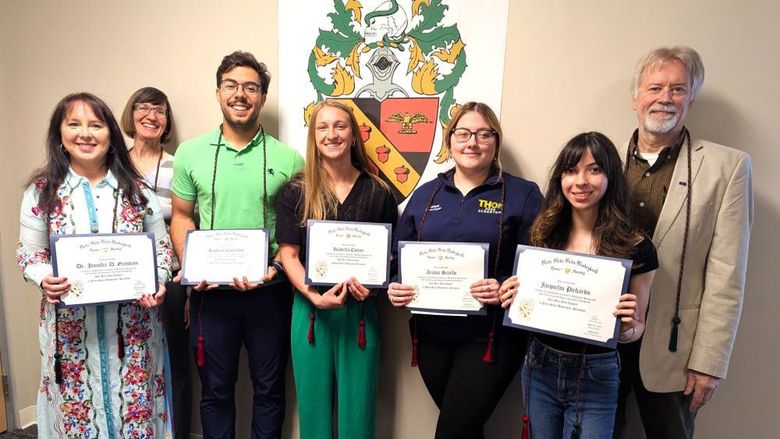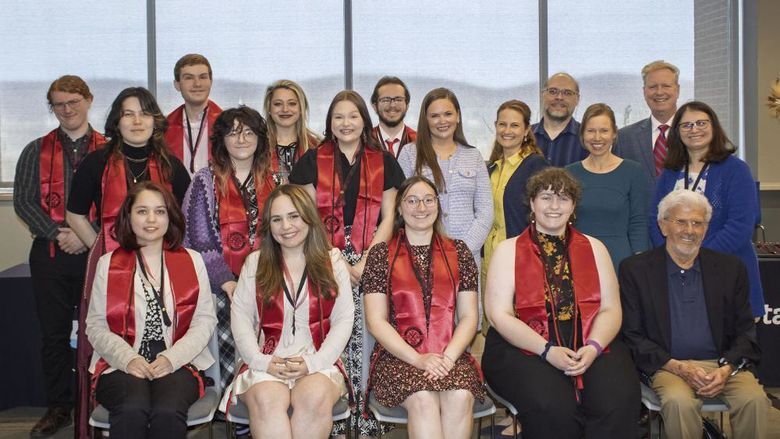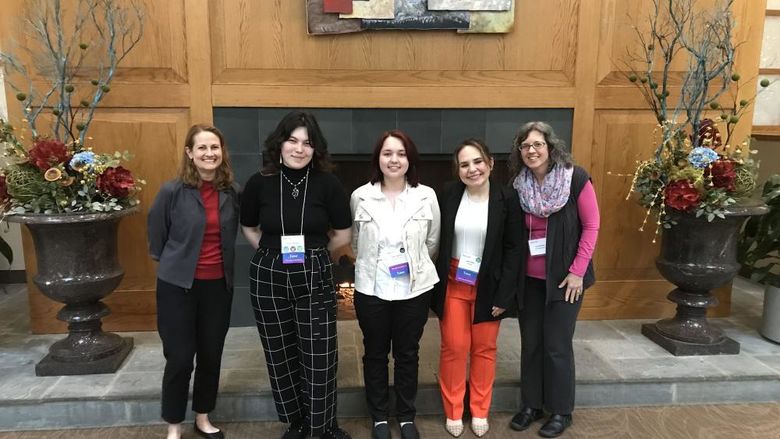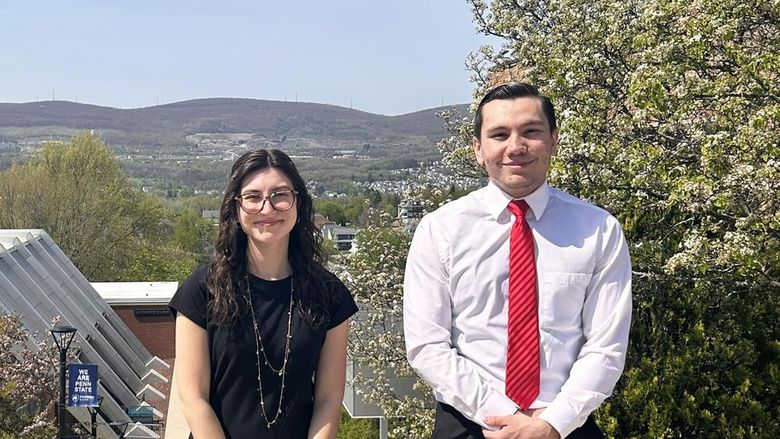
Penn State Scranton alumna, Kalei Kowalchik, who graduated in 2020 with a degree in nursing, and current senior Dhruvi Patel, a business administration major, are both first-generation college students and both credit the campus' staff, faculty and specific programs aimed at helping first-gen students for making their college careers successful, productive and enjoyable.
DUNMORE, Pa. — For years, Penn State Scranton has strived to provide first-generation college students with all the necessary tools to make their undergraduate experience a successful one.
Today, the campus’ commitment to this unique demographic remains as strong as ever. First-generation students remain a substantial percentage of Scranton’s overall student population, and about 47% of this fall’s new incoming students currently fall under that designation.
Given that, the campus has placed a premium on providing numerous financial, advising, academic and mentoring resources to first-generation students. Because they’re the first in their families to attend college, first-gen students often face a variety of challenges, from navigating the application process to securing financial aid and paying bills to scheduling courses to gaining access to peer tutors and mentors.
That partnership starts with the admissions staff, which guides students and parents through the complexities of the application, financial aid and bill-paying process. From there, the student services and engagement and advising teams effectively introduce them to campus academic and extracurricular life through New Student Orientation (NSO). Once the academic year begins, First Year Seminar (FYS) furthers that transition, while the campus' Learning Center provides additional academic support. And the campus’ brand-new JumpStart mentoring program has been designed specifically to retain and sustain first-generation, underrepresented and economically disadvantaged students.
“When we’re orienting first-generation students to the campus, we’re also orienting their families, because they don’t have a college experience to draw upon,” said Senior Admissions Counselor and Enrollment Marketing Specialist Julie Bialkowski. “We’re trying to support all students, but we know that because a lot of these students it’s their first experience with college, they have a lot more questions and don’t know how to navigate the process. There’s a lot of financial risk involved in a college education, so when we enroll you, we’re making a commitment to your success. It’s a partnership with the student and their family and Penn State. It’s all of our jobs to help them along and break down these barriers and show them the opportunities they have.”
All the right resources
For 2020 campus nursing program graduate Kaléi Kowalchik, college was always a priority, and she was supported in her goal by her family members. But, as a first-generation student, Kowalchik found the college application and acceptance process daunting. She ended up applying to several schools and was happily surprised to be accepted to all of them.
In the end, she chose Scranton.
“Little did I know that Penn State Scranton would become my college of choice and the best decision I ever made for myself," said Kowalchik, now a doctoral student in the University’s College of Nursing.
“I chose Penn State Scranton for a multitude of reasons -- it was close to my home, the class sizes were small, its nursing program was well established with access to great clinical and educational experiences, it was a well-known university with a developed alumni society, and, most importantly, it was affordable. As a first-generation college student, I knew college was expensive and would be my financial responsibility. After considering all my options, it was evident Penn State (Scranton) was the right choice for me.”
Many college students, regardless of their background, struggle to adjust to college. The difference for first-generation students, Kowalchik said, is having access to the resources and mentorship that can help them over those hurdles.
“As a first-generation college student, I often felt lost throughout the process — specifically the weeks leading up to my first semester of college,” she said. “I wasn’t sure what I was supposed to buy to prepare for school, I didn’t know where I was supposed to go, what the rigor of my classes would be like, or even how long I would be on campus.”
Luckily, the campus proved an easy place to make the transition to college life, Kowalchik said, noting NSO was extremely helpful in terms of introducing her to critical resources and offices, her student peers, faculty and staff, and the overall campus atmosphere.
“Little did I know that Penn State Scranton would become my college of choice and the best decision I ever made for myself."
— Kowalchik, doctoral student, College of Nursing
Coming from a single-parent household, Kowalchik was especially concerned about covering the cost of her education. So, she was grateful to have access to several campus grants and scholarships that alleviated some of her financial burden.
In addition, she was highly impressed with the seemingly endless student resources, and was gratified to befriend a large contingent of fellow first-generation students.
Gradually, she became happily immersed in campus life, thanks to its welcoming atmosphere.
“I was fortunate to get to know every department on campus as a student, and if that tells you anything about Penn State Scranton, it’s that it is warm, inviting, and caring," said Kowalchik.
“Penn State Scranton’s ability for their faculty and staff to engage with the students and make them feel at home makes it such a wonderful college environment to be a part of," she added. "As I learned more about the campus each week and became familiar with the faculty and staff, I was able to build connections and relationships with each department that helped support me throughout my academic journey, for which I am eternally grateful. The faculty and staff genuinely care about their students’ well-being and personal experiences to help support them throughout this difficult journey.”
A dream realized
Another first-generation student, senior Dhruvi Patel, said it was her Indian immigrant parents’ longtime dream to send her and her brother to college.
“My parents wanted to go to college but couldn’t because of their financial issues, so when we came to the U.S., they really pushed me and my brother to pursue whatever we loved,” said Patel, a business administration major with a concentration in accounting.
Penn State Scranton caught Patel’s interest because of its diversity and small-campus feel – in particular, she felt she’d get more one-on-one attention from faculty here than at other colleges.
“I love the campus and the faculty. They have pushed me to be better since day one and I wouldn’t be as confident as I am today if it wasn’t for them.”
— Dhruvi Patel, business administration, Penn State Scranton
With help, she successfully navigated her way through the application and financial aid process. Eventually, she also convinced her parents that “going to a small, public college instead of a big, private college wouldn’t make a difference because my career will depend on my hard work,” she said.
Since arriving at the campus, Patel has thrived in her coursework and taken full advantage of additional resources outside of the classroom, including resume writing and job interviewing assistance that she credits with helping her land her current internship.
Meanwhile, she’s completely devoted herself to extracurricular activities, serving as a peer mentor and tutor, Lion Ambassador and NSO leader. And she’s an avid participant in campus events and activities like Diwali, THON, bingo and Crafternoons.
Over time, Patel has forged close connections with numerous staff and faculty members, among them Bialkowski, Assistant Teaching Professor of Communication Arts and Sciences Jim Hart, Interim Director of Student Services and Engagement Matt Nied, Adjunct Lecturer in Business Pat Sheridan and Lecturer in Business and Economics Frank Sorokach.
“It was very important to be active on campus because I needed to figure out my college life and career on my own, and for that I needed to be confident and make connections,” said Patel, who intends to go to law school after completing her degree. “I love the campus and the faculty. They have pushed me to be better since day one and I wouldn’t be as confident as I am today if it wasn’t for them.”
Of course, it helps to have staff and faculty members who know firsthand the struggles of first-generation students. That list includes Associate Professor of Human Development and Family Studies and FYS Coordinator Raymond Petren, who was the first member of his family to earn a college degree.
“Even though my parents provided me with the opportunity, they couldn’t provide me with guidance for success in college,” Petren said. “When I got there, I was like a ship without a rudder. I didn’t know what I was supposed to do or say. I felt like an outsider among my peers who often seemed so comfortable in that new context. Many of my peers had both interpersonal and financial resources that I did not have as a first-generation student and a child of divorce from a working-class family. It was only when a mindful professor connected with me, noticed my potential and provided personal guidance that the fog lifted and I felt as though college was a place for me. That was in my third year.”
It’s Petren’s hope that FYS can provide students with the same level of support he received from that professor, albeit much earlier in their college careers.
“Not only does FYS acclimate students to the academic rigors of college, but it connects them with their peers, the Penn State Scranton community, and both campus and University systems that provide support and promote progress. It’s particularly important for first-generation college students, who are typically academically prepared, but often have less guidance from their parents or other family members as to how to navigate the college experience,” Petren said. “First-year students are also likely to experience imposter syndrome – uncertainty about whether they belong here. FYS helps them confront these challenges and identify both personal and institutional resources that foster personal growth and success. An important part of FYS is engagement with FYS peer mentors, who are more experienced students who form relationships with FYS students, share their own experiences and provide guidance in times of uncertainty. A number of our peer mentors are also first-generation students, so they have relevant experience to share.”
Nied added, “Our peer mentors really become that first line of defense in helping our first-generation students make the transition to college. For a lot of our students, they can just go home and ask mom and dad about a particular issue. First-generation students don’t have that. So, they’ll go to their peer mentor and ask, ‘How do I do this?’”
This comprehensive, compassionate approach to the first-generation experience appears to be working well, as both Kowalchik and Patel can attest.
“My decision to attend Penn State Scranton continues to be one of the best decisions I have ever made for myself, and I am very proud of the school I graduated from and continue to encourage others to apply and attend,” Kowalchik said. “Penn State Scranton is a well-rounded option for all student populations, but especially first-generation college students. Like any opportunity in life, you get out what you put in — meaning, you have to be willing to learn, explore, try new things and trust the process throughout your college experience.”
“I couldn’t have picked a better college — it’s like my second home!” Patel added. “I would recommend this campus to anyone in a heartbeat.”





